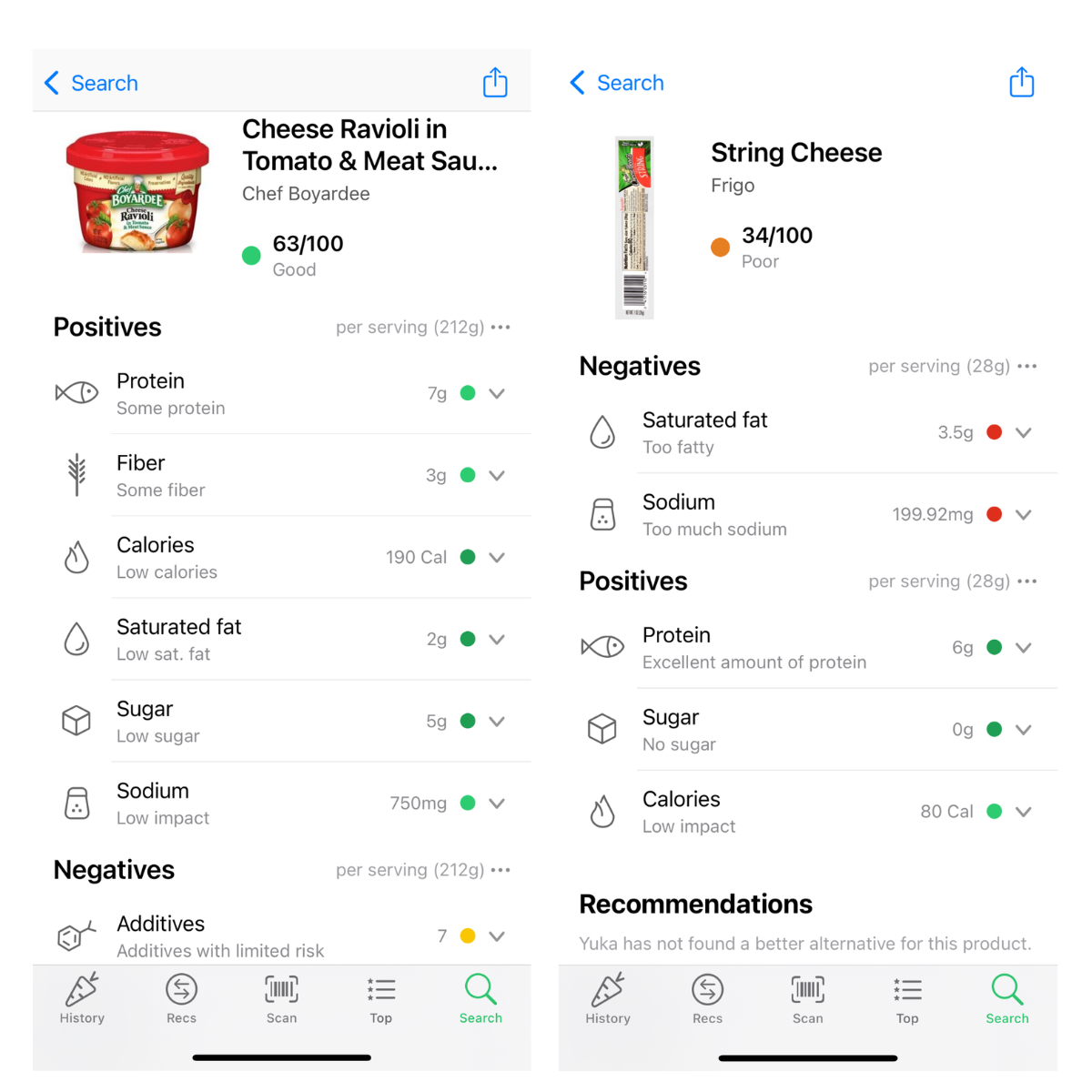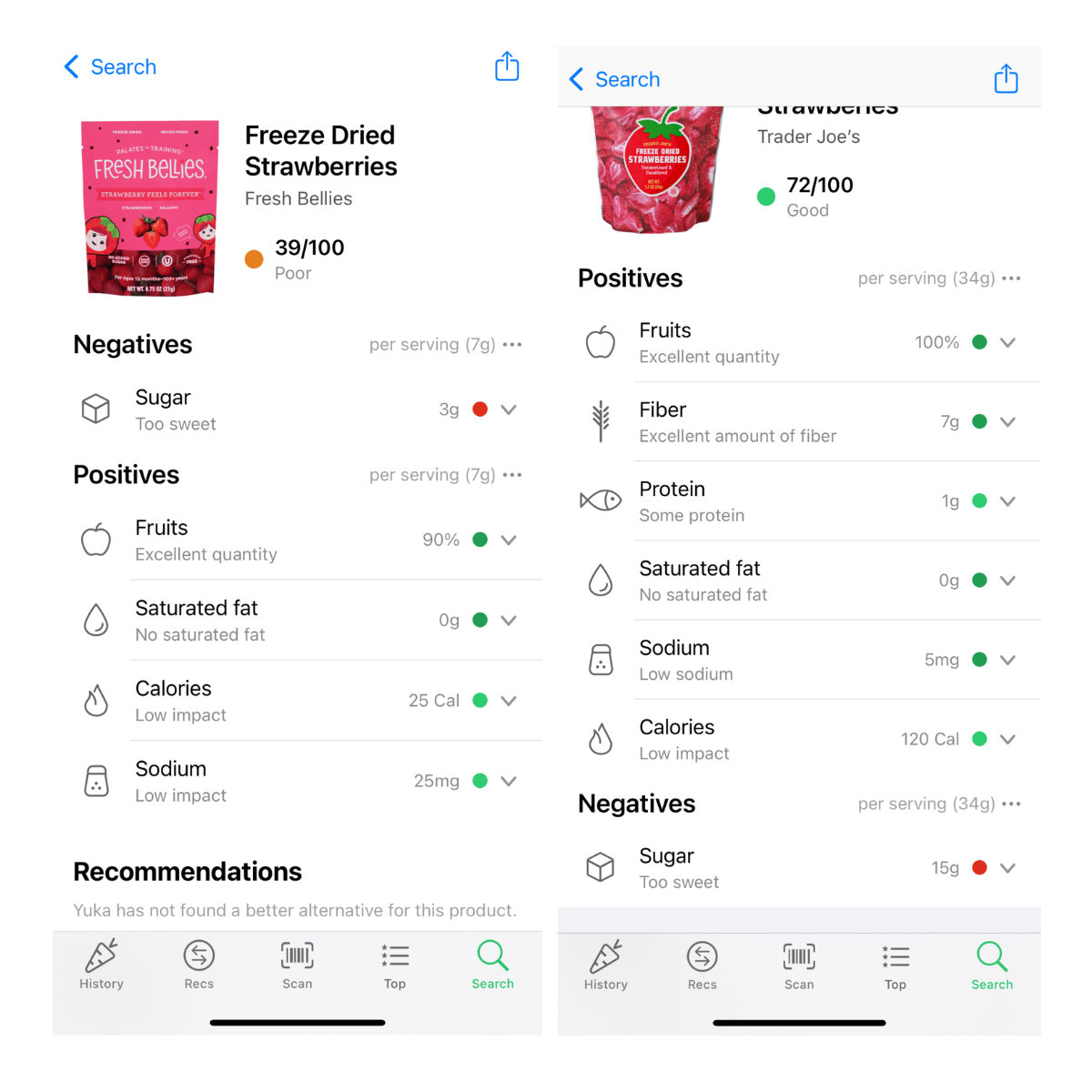Yuka App Reviews: the Truth from a Registered Dietitian
May 19, 2025, Updated Jul 24, 2025
This post contains affiliate links. Please see our disclosure policy.
Don’t use the Yuka app until you’ve read this! While it seems like a useful tool to scan food labels of the products you buy, see the ingredients, and see what the food is rated, I personally wouldn’t use it until you read this review from an experienced Registered Dietitian.

Let me be clear: I think it’s smart to be thoughtful about what you’re putting in your body. I’m all for making nutritious swaps.
But in my opinion, there are some crucial things that Yuka misses. Let’s talk about it.
Yuka App Reviews: The Truth from a Registered Dietitian
The Yuka app claims to help consumers make healthier choices by providing a breakdown of what ingredients are in each food, and scoring each food as good or bad. Unfortunately, it’s not that simple, even if you are using a good rating system.
Let’s look at how the app works (aka how they decide what’s good and bad) to see whether they’re using an accurate and reliable system.
Yuka App Review: How Does Yuka Score Food Products?
According to their website, they determine the score by weighting the ingredients 60% and the presence of additives 30%, and whether or not it is organic makes up 10%. We’ll talk about this rating system more below. Spoiler alert: that weighting is arbitrary at best and makes very little sense at worst.
Yuka App Review: Can Using Yuka Help You Eat Healthier?
Yes, it is possible that Yuka could help you eat healthier. I like that it is trying to steer you toward whole, fresh foods! But the potential negative side effects of letting Yuka have the last word in all your choices may negate the benefits of choosing healthier foods.
If you are someone who is prone to feeling guilty about your food choices, there’s a good chance Yuka will only make you feel worse.
Think about how you will feel when you see a “poor” rating on a food you love. Now you are very likely to feel badly about enjoying that food.
And if you’re thinking, “well I probably should feel bad about eating something that’s less nutritious.” No! Foods that we like are simply that — foods that we like. We don’t deserve to feel bad or guilty about something we enjoy! Can you choose to eat more nutritious options more often? Of course. But shame isn’t going to help us down that path.
Why I don’t trust the Yuka food rating system
It rates certain foods that I would consider nutritious (and dietitians across the globe would agree with me) like string cheese as “poor” – while we know that it contributes protein and calcium- nutrients our bodies need. String cheese probably gets a bad rating due to saturated fat. But we know that it’s okay to have saturated fat in moderation. No one is going to ruin their health over a string cheese snack. And choosing a string cheese doesn’t mean your saturated fat intake is going to automatically skyrocket into unhealthy ranges.
On Yuka, Frigo string cheese has a 34/100 rating, yet Chef Boyardee Cheese Ravioli has 63/100. The ravioli has 7g protein, 2g saturated fat, 750 mg sodium. The cheese stick has 6g protein, 3.5g saturated fat, and 200mg sodium. The math isn’t mathing. How can we say one of those is healthy (because of the 1 gram less of saturated fat? What about the 500 mg more sodium?). You can see my issue starting to form.

Fresh Bellies Freeze Dried Strawberries have a 39/100 (ingredients are strawberries, coconut oil, and balsamic vinegar). Trader Joe’s Freeze Dried Strawberries are almost identical (just minus the tiny drop of coconut oil and balsamic) and suddenly have a 72/100 “good” score. How can two products that are nearly identical have such different health scores?

Pros and Cons of the Yuka App
Like all things, there are pros and cons to the Yuka app. It’s certainly not all bad. And it isn’t all good either.
Pros of the Yuka app
It may help you avoid ultra-processed foods
Great! We love this! Limiting ultra-processed food in the diet is positive, as we definitively know that diets higher in ultra-processed foods are correlated with poorer health outcomes.
It may help you find healthier swaps for products you like (for example, switching to an unsweetened iced tea instead of sweetened)
Great! I love this, too! If you’ve been around Mama Knows Nutrition for any amount of time, you know that I love a good product swap. Whether it’s swapping Kraft mac and cheese for a higher-protein, higher-fiber option like Banza or Goodles, or using the no-sugar-added ketchup from True Made instead of Heinz, I love when we can choose a product that is still delicious, but with a little more nutritional oomph. (You also know I won’t shame you when you make a different choice!)
Choosing products that help us lower our consumption of added sugar or add in more nutrients is great.
It can help you increase your awareness of what you are eating
If you are just starting your journey toward eating healthier, I think it’s so important to be able to read food labels and to know what you’re eating. That’s exactly what empowers you to make choices that you feel good about for yourself and your family!

Cons of the Yuka app
The food rating system is flawed
As a dietitian, I don’t agree with their rating system, nor do I like to categorize foods as “good” or “bad” in the first place.
Their food rating system is not consistent and therefore not really trustworthy. How do we trust their ratings when their metrics seem to be selectively applied (i.e. one thing is rated poorly for its sodium content while something else is rated highly despite its higher sodium content)?
Here is an example of two almost identical pretzels; one is rated as “good” and the other as “poor” for no obvious reason. But then a different pretzel is ranked much higher, despite having higher calories and sodium, which was called out as a negative on the other two pretzels. Make it make sense!!

Higher scores are given to organic even though nutritionally we have well documented in the research that organic doesn’t mean healthier
Organic means organic. It doesn’t mean more nutritious. The difference between organic and conventionally produced food, from a nutrient standpoint, is negligible. I did a deep dive into that exact topic here. TLDR: buy organic because you like organic farming practices, not because an app told you it was better.
Additives are strongly negatively ranked, and while they claim they use research to support this decision, that doesn’t mean they are using good research.
Publications who demonize all additives (or “ingredients I can’t pronounce”) also like to use the argument that certain ingredients or items are banned in Europe as reason for why they should be banned here as well. But because Europe and the United States use fundamentally different approaches when it comes to these things, we aren’t really able to compare apples to apples here. Europe uses what we call a hazard-based approach- meaning that if an ingredient has the potential- at all- to harm you (regardless of how likely that harm is to happen or the dose at which harm might happen), they may choose to avoid it. A risk-based approach determines how high the risk of any harm, and makes calculated decisions on what to include/avoid based on the whole risk picture- including amount of exposure, etc.
You may like one of these approaches better than the other, but they aren’t the same. That’s why you may see different regulatory bodies/countries coming to different conclusions. It’s not because they’re looking at two entirely different bodies of research or someone is lying to you; it’s because they’re assessing them through two fundamentally different metrics.
This type of information can make people unnecessarily avoid too many foods and adopt an overly restrictive diet
This good/bad mindset can make people feel guilt and shame about foods that they enjoy, feel that they need to limit calories when they may not need to, become overly concerned about additives and conventional foods, and increase disordered eating which ultimately has many negative health (and mental health) consequences.
It’s confusing
There are candies rated as excellent, when we know that even low sugar candy is not contributing much nutritionally. So the app essentially encourages you to eat gummies (because some are rated as “excellent”), but discourages you from eating certain nut butters (JIF is rated “bad”). That’s just silly. Again, I’m great with a low-sugar candy swap, but let’s not pretend that it’s not still…candy. It’s not a more excellent food than another food that’s contributing more/different nutrients to the diet. And can we just let food be food instead of it being good girl food or bad girl food? It’s okay to have JIF, and it’s also okay to have the “healthy” candy. Doesn’t mean you’re good or bad for choosing or enjoying either.
Is The Yuka App Legit?
No. Need I say more?
I’m all for knowing what’s in our food. I’m all for making nutritious swaps and limiting things that we know, from actual research, are correlated with worse health outcomes.
But I’m not into arbitrary ranking systems that reinforce a good foods/bad foods fallacy with inconsistently applied and misguided parameters.

Who Owns The Yuka App?
Yuka was initially founded by 3 French people to rate French food and beauty products (remember the hazard-based vs. risk-based analysis? Europe typically relies more on a hazard-based approach. Whereas the US relies more on a risk-based approach- meaning that the way we “rate” a product has to do with our relationship to hazards and risks in assessing safety). It has grown and expanded into the US and now has a larger team.
Apps Like Yuka
The Yuka app reminds me a little bit of the Think Dirty app and the EWG database. Those aren’t all exactly the same, but I have some *similar* qualms with all of them.
Please don’t hear me saying that health-promoting apps/databases are all bad. They’re not! In fact, I recommend a lot of the same products that rank “highly” on Yuka.
I totally believe that people having more information about nutrition can have an overall positive impact. But because of all the flaws baked into the rating system, these apps also shouldn’t have the final say on what you can or can’t eat.
If you need to avoid certain ingredients, or follow a specific diet- like a vegan or vegetarian diet- the app Fig is a helpful choice. It doesn’t rank good vs. bad, but helps you more quickly and easily identify products that will work for you.
Is Yuka a Trustworthy App?
I think you’d be better off directing your time and energy into becoming skilled at reading food labels rather than letting the Yuka app tell you what’s best. If you want to keep an eye on overall sodium intake, limit added sugar in the diet, or choose high-protein snacks- great! You can do that by just making note of those things yourself while you’re in the grocery store and choosing products that align with your goals while staying away from the good food/bad food dichotomy that is the root of a lot of food shame.















The point that as Americans we have to use an app to shop for food shows how our FDA and Regulatory Departments have prostituted themselves to Big Agra and Big Pharma. Our European cousins across the pond hold a much higher standard when it comes to all food products. It’s very disheartening. Even Putin will not allow GMO crops. The Statue of Liberty should be replaced with a Stripper on a pole.
Interesting how you didn’t talk about the additives and chemicals that reconstruct your DNA or have severe effects on the immune and reproductive systems and just touched on miscalculations and sugar intake. Who paid you to talk bad about Yuka? smh
of course you should be ashamed of eating bad foods duh, sugar addictions are real. Inflammation is real diabetes and obesity come from not being ashamed.
Thank you. I was dumbfounded when I became aware of Yuka’s biases.
I mainly use Yuka to look for the dangerous additives. I know that cookies are going to be high in sugar – that’s the point (LOL).
THank you for this excellent article. I only downloaded the app a week ago and as a non-expert was coming to similar conclusions. One example:
My favourite Orkney Herrings [aka soused herring, rollmops…] with Dill, whose label I had to upload to the site, came in at 2/100, Bad. Too much salt and sugar in the vinegar, it seems. A bit harsh – I’d have thought picked raw fish rich in Omega 3 should score higher than that. It was only 1 higher than the Meica Bockwurst frankfurter sausages in a jar which were on sale at the NT campsite where I park to go birdwatching and which I scanned for mischief (1/100, Bad, additives to avoid).
Also, I see that my scanning of the frankfurters counts against me in “My Food” pie chart – I wouldn’t have dreamed of buying them let alone eating them. The site seems to have assumed I did. I thought the whole point was scanning things before you bought them!
Agree the Yuka app has pros and cons. Prefer not to have chemicals in the food I eat, or even the cosmetics, lotions, body washes I use. With organic, the food isn’t contaminated with pesticides, which is a plus. On the other hand, organic is more expensive and not always affordable. Don’t agree with all their ratings; for example: French’s yellow mustard received a lower rating than the organic French’s yellow mustard. There were no chemicals listed on the Yuka app in the regular mustard, and it has less sodium than the organic mustard. That doesn’t compute.
Bought a box of the Ezekiel 4:9 cereal which is a little pricy, but wanted to try it; (I buy that brand of bread because I’m gluten free). It tastes just like Grape-nuts. So I bought a box of Grape-nuts even though the rating was only good compared to the Ezekiel 4:9 excellent rating. Also noticed on the nutrition facts on the Ezekiel 4:9 box, some of the numbers were slightly different than what the Yuka app listed. Whether it’s because of a change in amounts of the ingredients from the time Yuka posted it…can only speculate. The nutrition facts on both boxes are very similar. There’s more ingredients, (all organic), on the Ezekiel 4:9 cereal. There’s only 4 ingredients on the Grape-nuts cereal. Conclusion: it comes down to a matter of choice, what you can afford and hopefully still a healthy choice, and being a wise steward of your money.
As a fellow RD, THANK YOU for writing this. I have many patients who came to me using it and It can be scary how much they depend on it. My daughters friend age 16 was living by and eventually had 16 foods he would eat and essentially developed orthorexia from using Yuka. I think we all, as medical professionals, need to be aware of these and even download and play around with them to better educate our patients on the risks. I’ve notices sucralose as an ingredient triggering as BAD and Harmful but when you rabbit trail to the actual research it’s an article on aspartame and not even a good study. Many of the so called studies they site aren’t even studies at all. Oh and try scanning a premier protein shake or similar, it can’t even score it! I mean there is a place for those if needed but by definition they are also ultra processed foods (not bad though). I agree whole food eating is always the go to but I want to thank you for putting excellent words and examples to the thoughts I already had.
You’re missing the point about sodium, it’s all about different serving sizes. People won’t be told how much they should eat (no shaming, as you say) so serving sizes are just arbitrary and pointless. Take all sodium values to an equal 100g basis and you will see that Yuka’s ranking makes sense in the examples you cited. Just do the little math.
Exactly. Talk about bad math.
I was searching in the comments for someone to have highlighted the naivety of the author here’s understanding of math. Thankfully you have done that. I love the fact that she says:
“But then a different pretzel is ranked much higher, despite having higher calories and sodium, which was called out as a negative on the other two pretzels. Make it make sense!!”
Seriously, how can someone consider themselves to be a qualified dietitian, if they can’t understand the difference between % and weight?!
The pretzel on the right is better rated as it has a SERVIING size larger than those in the middle and the left. It is therefore “better” because the PERCENTAGE of the bad stuff is lower, as it has less sugar, salt and calories PER GRAM. Obviously Yuka isn’t yet clever enough to tell you how many pretzels you should eat either, it’s just highlighting obvious and hidden bad stuff in the ingredients.
Excellent review of Yuka! Thoroughly enjoyed reading!